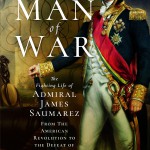Publications : 1273
-
 PublicationNapoléon: Images of the Napoleonic legend
PublicationNapoléon: Images of the Napoleonic legendThis bilingual French-English catalogue is published on the occasion of the exhibition at Arras (until November 2018) show-casing the Napoleonic collection from the Château de Versailles. It includes full-colour illustrations of all the artworks, each accompanied by a detailed mini article, as well as thematic articles by Jean Tulard (“The orgins of the Napoleonic Legend: […]
-
 PublicationFar Distant Ships: The Blockade of Brest, 1793-1815
PublicationFar Distant Ships: The Blockade of Brest, 1793-1815Throughout the long drawn out war at sea during the French Revolutionary and Napoleonic Wars, it was a cardinal principle of British naval strategy to blockade the port of Brest, the largest and most important of the French naval bases that threatened the security of the British Isles. It was a strategy that had been […]
-
 PublicationWellington’s Brigade Commanders: Peninsula and Waterloo
PublicationWellington’s Brigade Commanders: Peninsula and WaterlooPublisher’s note: Recent research into the Duke of Wellington’s armies during the Peninsular War and the Waterloo campaign has enhanced our understanding of the men he led, and this new biographical guide to his brigade commanders is a valuable contribution to this growing field. Ron McGuigan and Robert Burnham have investigated the lives and careers […]
-
 PublicationThe Forgotten war against Napoleon: Conflict in the Mediterranean
PublicationThe Forgotten war against Napoleon: Conflict in the MediterraneanPublisher’s note: The campaigns fought against Napoleon in the Iberian peninsula, in France, Germany, Italy and Russia and across the rest of Europe have been described and analysed in exhaustive detail, yet the history of the fighting in the Mediterranean has rarely been studied as a separate theatre of the conflict. Gareth Glover sets this […]
-
 PublicationNelson’s right hand Man: The life and times of Vice Admiral Sir Thomas Fremantle
PublicationNelson’s right hand Man: The life and times of Vice Admiral Sir Thomas FremantleFrom the Publishers: “This is the story of Thomas Fremantle, one of Britain’s greatest naval captains and Lord Nelson’s closest friend and ally. The two, bound in friendship, were part of a Navy that ensured Napoleon could never invade Britain. The naval campaign culminated in the great victory at Trafalgar and, with the fleet in […]
-
 PublicationMan of War: The fighting life of Admiral James Saumarez: from the American Revolution to the defeat of Napoleon
PublicationMan of War: The fighting life of Admiral James Saumarez: from the American Revolution to the defeat of NapoleonFrom the Publishers: “The career of Guernsey-born Admiral James Saumarez reads like an early history of the Royal Navy. His first battle was against the American revolutionaries in 1775, but thereafter his main opponents were the French and the Spanish, and the first fighting ship he commanded, the eight-gun galley Spitfire, was involved in forty-seven […]
-
 PublicationGodoy’s Army: Spanish Regiments and Uniforms from the Estado Militar of 1800 (From Reason to Revolution)
PublicationGodoy’s Army: Spanish Regiments and Uniforms from the Estado Militar of 1800 (From Reason to Revolution)Publisher’s note: Based on an extremely rare (albeit slightly incomplete) illustrated version of the Spanish Army’s order of battle as it existed in the year 1800, this work cannot but form a most unusual addition to the collection of anyone interested in military uniforms (or, more specifically, the Revolutionary and Napoleonic era). Almost every regiment […]
-
 PublicationThe French Army of the Orient 1798-1801: Napoleon’s beloved ‘Egyptians’ (From Reason to Revolution)
PublicationThe French Army of the Orient 1798-1801: Napoleon’s beloved ‘Egyptians’ (From Reason to Revolution)Publisher’s note: More than 200 years ago – under the inspiration and leadership of Bonaparte – a revolutionary French Army invaded Egypt, then part of the Ottoman Empire; this presence lasted beyond Bonaparte’s own departure and subsequent rise to power as First Consul. It ended with another invasion – this time by the British – […]
-
 PublicationWaterloo: Rout and Retreat
PublicationWaterloo: Rout and RetreatPublisher’s note: This, the fourth volume in Andrew Field’s highly praised study of the Waterloo campaign from the French perspective, depicts in vivid detail the often neglected final phase the rout and retreat of Napoleon’s army. The text is based exclusively on French eyewitness accounts which give an inside view of the immediate aftermath of […]
-
 PublicationWaterloo: The 1815 Campaign: from Waterloo to the restoration of peace in Europe, Volume II
PublicationWaterloo: The 1815 Campaign: from Waterloo to the restoration of peace in Europe, Volume IIThe concluding volume of this work provides a fresh description of the climatic battle of Waterloo placed in the context of the whole campaign. It discusses several vexed questions: Bl cher s intentions for the battle, Wellington s choice of site, his reasons for placing substantial forces at Hal, the placement of Napoleon s artillery, […]

